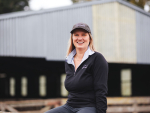He told a meeting of 100 business people in Dannevirke last week that child, or paediatric, nutrition is the fastest growing dairy category in the world.
He says parents are demanding dairy products to support growth in development of children and babies.
Monaghan and Carolyn Mortland, Fonterra’s policy manager, were invited to the meeting to explain what the cooperative is achieving globally and how it’s managing sustainability issues.
Monaghan said there is a clear opportunity to extend dairy further as a trusted nutrition for mothers and babies and to the elderly where there is extra demand from older consumers wanting to stay fit and active.
“Our focus is on developing dairy products that supply nutrition for the elderly. These products are designed not only to provide a nutritional diet but also to help increase mobility.
“Another focus is on consumers who eat convenience food such as pizzas, yogurts and take-home meals. It’s an area which relies heavily on innovation particularly as the world demands convenience foods that are better for you, and it’s an area where we see continued growth.”
Monaghan says demand for dairy is greatest in ‘emerging markets’ where there are at least two billion consumers. By 2020 there will be 500 million more ‘new middle class’ people.
“We are not trying to feed the world, we are trying to feed those middle class customers who can afford to pay us well for our products. There is a new generation of consumers with more money to spend.”
Demand in China from bakeries for cheese and cream is growing hugely with cities such as Shanghai experiencing annual growth of 20-30%.
As an example of dairy industry growth, Monaghan notes that every 35 seconds a shipping container is loaded for export by Fonterra. He says the co-op also collects 22 billion litres of milk a year – two thirds of it from New Zealand farmers.
On environmental issues Mortland told the meeting that Fonterra and its farmers recognise the need to meet the changing environmental requirements of regional councils. She says Fonterra is putting significant resources into this area because it recognises much of its competitive advantage comes from the country’s ‘natural bounty’ such temperate climate, good soils, great pasture and fresh water.
“As stewards of the land we understand these natural resources underpin and support farmers’ businesses and our cooperative. We conduct 10,600 environment farm visits every year. And farmers have fenced 24,000km of waterways and have done 4000 effluent improvement projects. This means one third of our farmers have invested capital and changed systems or management practices to ensure their effluent systems are capable of complying with regional council requirements for 365 days of the year.”
Mortland says the challenge for councils is to get a regulatory framework that allows for responsible, sustainable and profitable use of natural resources.
















